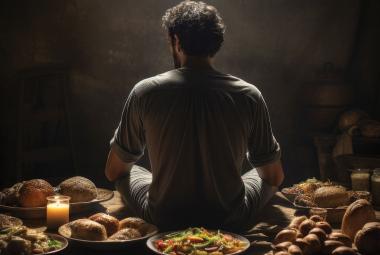May each of you have a very Happy and Blessed New Year. May your fellowship with the Lord grow even more intimate; your relationship with others more real and may you become even more sensitive to the Spirit’s leading in your life.
Personally, I am so excited about 2008 because my new book, The Kingdom, Power and Glory (The Overcomer’s Handbook), is coming out. After being Christians for over 50 years, Chuck and I consider the truths in this book to be some of the most life-changing principles we have encountered since our new birth.
It’s a book about the “power of God,” about becoming “overcomers,” and about the incredible “Millennial promises” made to those overcomers. Some of the questions we answer in the book are:
• Will eternity be the same for believers who follow Christ faithfully and those who live a carnal lifestyle?
• Does our behavior as Christians matter once we are assured of our salvation?
• How do we, as believers, overcome the world, the flesh and the devil?
• Scripture says we are to “prepare ourselves” for Christ’s soon return. What does this mean for each of us personally? What’s at stake?
Again, my passion has always been “practical application.” So this will be an easy-to-read handbook that, prayerfully, will help us “walk out our faith.” We hope to have the book published next month. Please pray. The enemy doesn’t want this one out for sure!
Continuing our series on Reflecting His Image, this month’s article is also very appropriate for the beginning of a New Year. What is “maturity in Christ,” why is it so important, and how do we achieve it?
The mature Christian is simply one who recognizes his self-life and makes the appropriate moment-by-moment choices to give it over to God. Maturity in Christ is not knowing an abundance of theological facts, going to church regularly, teaching Bible studies or even writing books. Maturity in Christ is simply making the right faith choice to cleanse ourselves of all God shows us is of the flesh, so that His Life can then come forth.
In other words, the people who are mature are the ones who are constantly watching for and recognizing their own sin and self. They are mature only because they know how to recognize the flesh and then, how to make choices to hand it over to God.
One of the ways we can tell how mature in the Lord we are is by how sensitive we are to seeing our own sin. And, I find this to be so true. The longer I am with the Lord, the more sin and self I see in me.
Naturally, even as Christians, we are still full of self-our own natural thoughts, emotions and desires-especially in trials. Some of these thoughts and emotions are fully justified by the world’s standards. But by God’s standards, because we hold on to them, mull them over in our minds and then act upon them, these negative thoughts and emotions end up quenching God’s Spirit in us.
If we can learn to give our real feelings and thoughts over to God and choose by faith to follow God’s will, then He will align our feelings with our faith choices and make us genuine.
That’s all maturity in Christ is--less of me and more of Him!
Learning to Deny Self
A Scripture that perfectly describes maturity in Christ is Matthew 16:24: If any man will come after Me, let him deny himself, take up his cross, and follow Me. (Mark 8:34; and Luke 9:23)
To deny in the above Scripture does not mean to push down and bury real feelings and negate their existence. Many of us have been doing this out of habit because we’ve previously been taught we’re not supposed to have negative thoughts and feelings.
What we fail to realize, however, is that one of the benefits of being in Christ is that we have the freedom to be honest and genuine--to acknowledge our real thoughts and emotions even if they are bad. Then we have the freedom to confess them, repent of them and give them over to the Lord (lay them at the Cross).
As a result, He takes them and we can be free altogether. Thus, “to deny” in the context of the above Matthew Scripture means to bar ourselves or prevent ourselves from following what we naturally think and feel. Again, we’re all human and we’ll all have negative thoughts and feelings until the day we see Jesus. Denying ourselves simply means choosing not to follow these things.
Thus, it’s important that when we look at our real thoughts and feelings, we call them for what they are so we’ll know exactly what to give over to the Lord. Then, we must bar ourselves or prevent ourselves from following what these negative elements are telling us and, instead, give them to the Lord. Then we’ll be free to follow what He wants.
Self-denial, therefore, is the law of the Christian life. Even though our “old nature” has been positionally crucified, he is still not dead. Daily, he must be nailed to the cross. In other words, the Cross is the chief mark of a mature Christian. It’s what true maturity is all about. We are to deny our self, pick up our cross and follow Him. (Galatians 6:14)
Suffering For Christ
It’s difficult to talk about denying self and the Cross without at least mentioning the principle of suffering for Christ. It’s interesting, because throughout Scripture “glorifying the Lord” and “suffering for Him” always seem to be linked. It’s a pattern that we see over and over again. (See John 11:1-4) Indeed, glorifying the Lord seems to be the result of suffering for Him. (1 Peter 1:11)
Suffering simply means choosing to bar ourselves from following what we think, feel and want and, instead, choosing to do what God wants. In other words, suffering often occurs as a result of denying ourselves. Just as Jesus valiantly chose to set Himself aside, endure the Cross and follow what God wanted Him to do, He suffered. (Matthew 26:39; Philippians 2:5-8) So we, too, often suffer when we choose to deny ourselves, pick up our cross and follow Him.
One of God’s purposes for suffering is to highlight the things in our own lives that must be dealt with. He wants us to make an honest self-evaluation of ourselves, which in turn, should lead us to confession, repentance and a change of lifestyle.
Again, spiritual death must precede spiritual life. We must decrease, so that He can increase. (John 3:30) We must be stripped of self, so that we can then be filled with Him.
The Fellowship of the Unashamed
The following prose eloquently describes what “maturity in Christ” really is. It’s called The Fellowship of the Unashamed and was written by a young Zimbabwe pastor who was martyred for his faith in Christ.
“The dye has been cast. The decision has been made. I have stepped over the line. I won’t look back, let up, slow down or back away. My past is redeemed, my present makes sense, my future is secure. I am finished and done with low living, sight walking, small planning, smooth knees, colorless dreams, tame visions, mundane talking, cheap giving and dwarfed goals.
“I no longer need preeminence, prosperity, position, promotions, plaudits or popularity. I don’t have to be right, first, tops, recognized, praised, regarded or rewarded. I now live by faith, lean on His presence, walk with patience, live by prayer and labor with power. My face is set. My gait is fast. My goal is heaven. My road is narrow. My way is rough. My companions are few. My Guide is reliable. My mission is clear. I cannot be bought, compromised, detoured, lured away, turned back, deluded or delayed.
“I will not flinch in the face of sacrifice, hesitate in the presence of adversity, negotiate at the table of the enemy, ponder at the pool of popularity, or meander in the maze of mediocrity. I won’t give up, shut up, let up, until I have stayed up, prayed up, stored up, paid up and spoken up for the cause of Christ.
“I am a disciple of Jesus Christ. I must go till He comes, give till I drop, preach till all know and work till He stops me, and when He comes for His own, He will have no problem recognizing me. My banner is clear. I am part of the fellowship of the unashamed.”
May every one of us be able to say those same words in 2008 and mean them with the same passion and conviction as this dear Zimbabwe pastor.
To be continued next month: “What is God’s Will?” This article has been excerpted in part from Nan’s book, Reflections of His Image.




